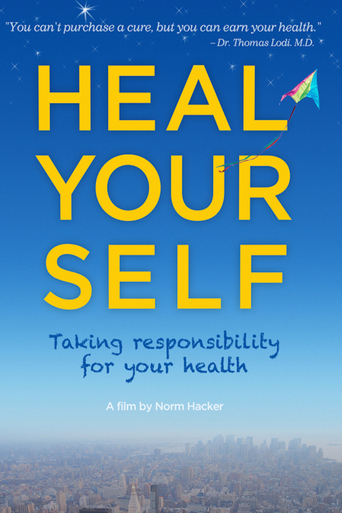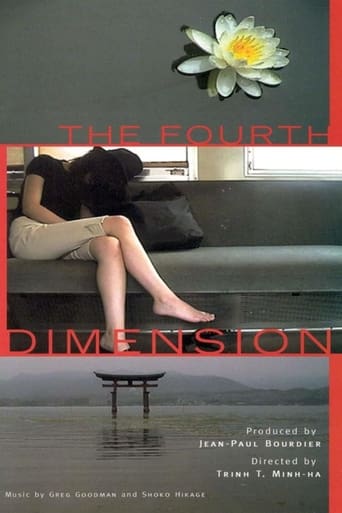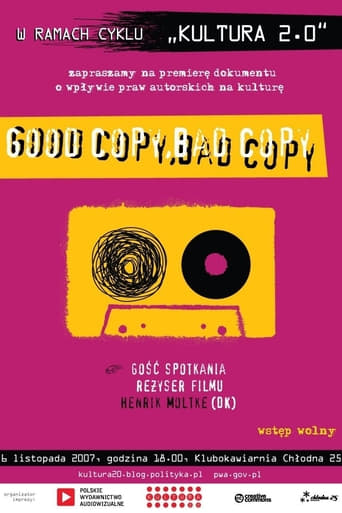
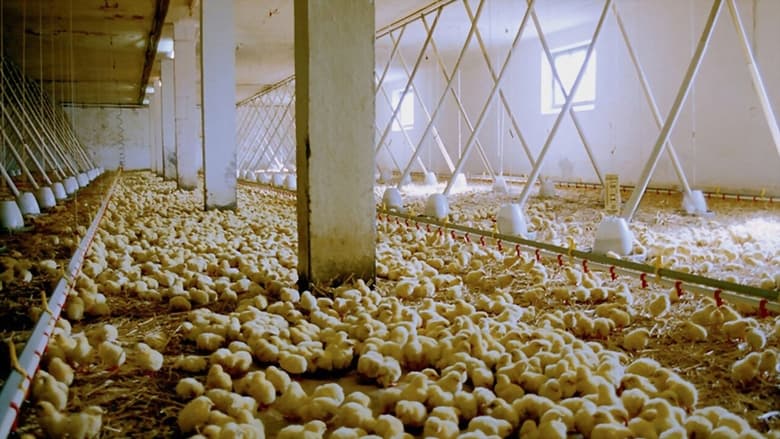
We Feed the World (2005)
A documentary that exposes the shocking truths behind industrial food production and food wastage, focusing on fishing, livestock and crop farming. A must-see for anyone interested in the true cost of the food on their plate.
Watch Trailer
Cast
Similar titles
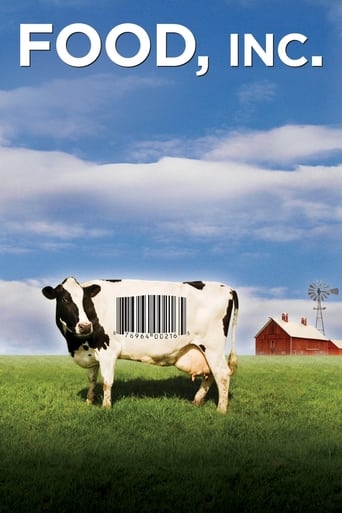
Reviews
i must have seen a different film!!
A story that's too fascinating to pass by...
A great movie, one of the best of this year. There was a bit of confusion at one point in the plot, but nothing serious.
The thing I enjoyed most about the film is the fact that it doesn't shy away from being a super-sized-cliche;
Well, if you're a beginner in knowledge of globalism and / or capitalism, this movie may be very interesting for you. It shows you a new perspective of life on earth; people who get exploited for the profit of a few ones. Men looses their jobs at the dictations of EU and modern technology; vegetables are grown up by some new kind of hybrid-seeds, which in the end also just maximizes the profit of CEOs. All in all: Capitalism destroys mankind. Nothing new. Don't misunderstand me: Im by myself a huge enemy of capitalism, better to say: I hate it. But this movie doesn't show anything I don't already know. Some nice pictures, underlined by sad and / or depressed people who suffer from exploitation. What I criticize is that you don't get explained the whole complex thats involved in this. 'Cause its much more. So we had to see more about politics, about suppression, about corporations and their daily work (well, Nestle was a good example, but too close to the surface.)All in all a good movie for Children and people who want to learn about how global-economics work. 7/10.
This documentary was the talk about town for a while in my corner of the world, so I was quite keen to see it. It turned out the be the type of movie which would have thrown me into the thralls of delicious juvenile mal de vivre when I was still juvenile; nowadays I see it less benevolently as subtle manipulation on part of the filmmaker. Basically the movie delivers a pastiche of interesting images and statements, and then juxtaposes them in an unnerving way. We see large soy bean plantations being cut into the Brazilian rainforest (or is it just Brazilian forest?), some talking head says that the ground there is totally unsuitable for soy bean production (whatever that means), there is a text insert stating that an enormous amount of Brazilian rainforest has been cut down (although it doesn't say whether this was for soy bean production), then we see images of desperately poor Brazilians who don't have enough food to eat or access to clean water -- all this with images of tons of slightly stale bread being dumped in Vienna still lingering in the viewer's mind from the opening scene. OK, what do we make of this, apart from the fact that the world is an imperfect place? How do we get those loaves of bread from Vienna to the Brazilian wastelands? The movie has no intention of telling you, it contents itself with subtly upsetting its viewers -- it leaves you in no doubt that something is wrong in the state of Denmark, but doesn't tell you exactly what it is or how to fix it. Maybe one way to help those peasants would be to give them work on the soy bean plantation, but then the movie is against the global food trade -- so no dice. It is also against farm subsidies and protectionism, and suggests that food is generally too cheap and that local farmers should earn more, while the multinationals are making far too much money -- all of which is certainly well-intentioned, but also contradictory. If you have smartened up and turned away from buying the cheapest and most processed foodstuffs, if you try to buy regionally and seasonally, and are paying more attention at taste rather than looks, then you are already past this movie. However if you are a less discerning consumer then this movie is probably a good starter.
So I begin my selection of this year's SIFF with a documentary. Directed by Erwin Wagenhofer, We Feed the World begins by highlighting a very fundamental wastage. That of overnight bread, tons of it being offloaded, meant for the incinerated, when there are thousands left hungry.The documentary focuses on various aspects on the supply side of the food chain, giving some insight to the various industries which produce food, like fishing, vegetables and poultry. It also provides a glimpse into the political side of supplying food, that of the profit maximization strategy of any public company (here, it's Nestle), of the genetically modified seeds which supposedly produces superior crop as opposed to better tasting, natural ones, and various EU plans and initiatives which seem to go down the wrong path instead of fulfilling its supposedly planned objectives.While it covers a lot of ground, some segments proved to be a little draggy and preachy. I particularly enjoyed the segment on the fishing industry, where there are plans to wrest knowledge from the small timers operating smaller fishing operations, and to eventually merge/close them down when the bigger boys come into the picture. As demonstrated in the movie, there are reasons why big trawlers doesn't equate to fresher and better catches.The other segment which moved was on the Brazilian's poor north-eastern parts, where on one hand, you have very poor people going hungry all the time, yet Brazil's one of the major exporters of maize to Europe. Maize which are used for burning for fuel generation. It just boggles the mind, and makes you feel sad at the way things work, illogical as it may seem, in the name of profit - watching the kids drink untreated murky water, and the adults resorting to unnatural means of keeping their children alive, will gloom your day.And I could have swore off chicken come the final segment. Nowadays lifestock are treated as an 8-week cycle of a production line, from incubating, hatching, fattening, until the final days of slaughtering, where they're hung upside down by the legs in conveyor belts, before passing through a circular bladed discs where their throats are slit, and left bleeding till death. For those which are missed by the blades, there is a butcher on standby with a knife to do the deed.But while the movie tried to made its points, what I found lacking are the many ways in which to link the message to the issues. Many times it felt a little sporadic, or the linking done quite weakly through intertitles. That aside, perhaps I'm already attuned to the more in-your-face style of Michael Moore, nevermind if there are echoes that his style is manipulative. For a topic like this, perhaps it could gain from that bit of controversy to hammer its opinions through.
I saw this film at the 2005 Toronto International Film Festival. I would call this film a Mondovino for food. By which I mean it is an examination of how globalization and the growth of the power of corporations has affected the production of food. The director dispassionately takes us to farms in Romania and Brazil, a fishing boat in Brittany, a greenhouse in southern Spain, and a chicken processing plant in Austria.In all these places, we see traditional practices being abandoned in favour of giant factory operations. In each place, someone on camera asserts that flavour is not as important as price or appearance. So we see hothouse tomatoes being driven 2500 kilometres to be sold, we see rain forest cleared to grow soybeans, even though the soil is unsuitable, and we see the entire eight-week life cycle of thousands of chickens, raised to supply the incessant demands of the world for cheap food. Watching factory-farmed chickens being "processed" might be enough to turn some people into vegetarians. Except for the fact that our vegetables are really no better.There is some interesting information about GM (genetically modified) crops which are resistant to herbicides like Monsanto's Roundup and the growing use of hybrid seed. Unlike regular seed, which farmers used to save from year to year, hybrid seed cannot be used to raise a second crop, forcing farmers to keep buying seed from large seed firms like Pioneer. This raises all kinds of issues, and I really think the film could have spent more time here.The film ends with an interview with the CEO of Nestlé, the largest food manufacturer in the world, who muses on "attaching a value" to water, and calls the position of the NGOs, that access to clean water is a human right, "extreme". After bragging how many jobs his corporation is creating, and how many families it is supporting, he glances at an informational video of one of Nestlé's Japanese factories, and marvels how it is so roboticized. "Hardly any people," he crows.The only significant weakness to this documentary was its unrelenting gloom. I would have liked to have been given some ammunition or to have seen some success stories, or at least some rebellion. But there wasn't any. Since I have an interest in this area, I can point you to the Slow Food organization, which is trying to encourage more consumption of local products and the preservation of disappearing foodstuffs. But I really wish the director had done it instead.

